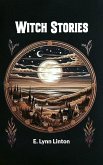In "Witch Stories," E. Lynn Linton intricately weaves a collection of narratives that delve into the profound complexities of societal constructs surrounding witchcraft and femininity. Employing a compelling blend of Gothic sensibilities and keen social commentary, Linton crafts tales that explore the intersections between power, gender, and the superstition of her time. The literary style is marked by lush descriptions and psychological depth, inviting readers to ponder the impact of witchcraft on personal and communal identities within Victorian society, illustrating both fear and fascination with the so-called 'other.' E. Lynn Linton was a prominent figure in the 19th-century literary scene, known for her progressive views on women's rights and her critiques of social norms. Her own experiences as a woman writer in a largely patriarchal world may have invigorated her candid exploration of witchcraft as both a metaphor for female empowerment and an examination of societal oppression. Linton's background as an outspoken advocate for women's roles in literature reflects her intention to challenge the prevailing stereotypes of women as either innocent victims or malevolent figures. "Witch Stories" serves as a vital exploration of hidden narratives that challenges readers to reconsider modern interpretations of power, femininity, and societal judgment. This book is highly recommended for scholars, feminists, and avid readers of Gothic literature, offering a rich tapestry of stories that resonate beyond their era, inviting contemporary reflection on enduring themes.
Dieser Download kann aus rechtlichen Gründen nur mit Rechnungsadresse in A, B, BG, CY, CZ, D, DK, EW, E, FIN, F, GR, H, IRL, I, LT, L, LR, M, NL, PL, P, R, S, SLO, SK ausgeliefert werden.
Hinweis: Dieser Artikel kann nur an eine deutsche Lieferadresse ausgeliefert werden.









